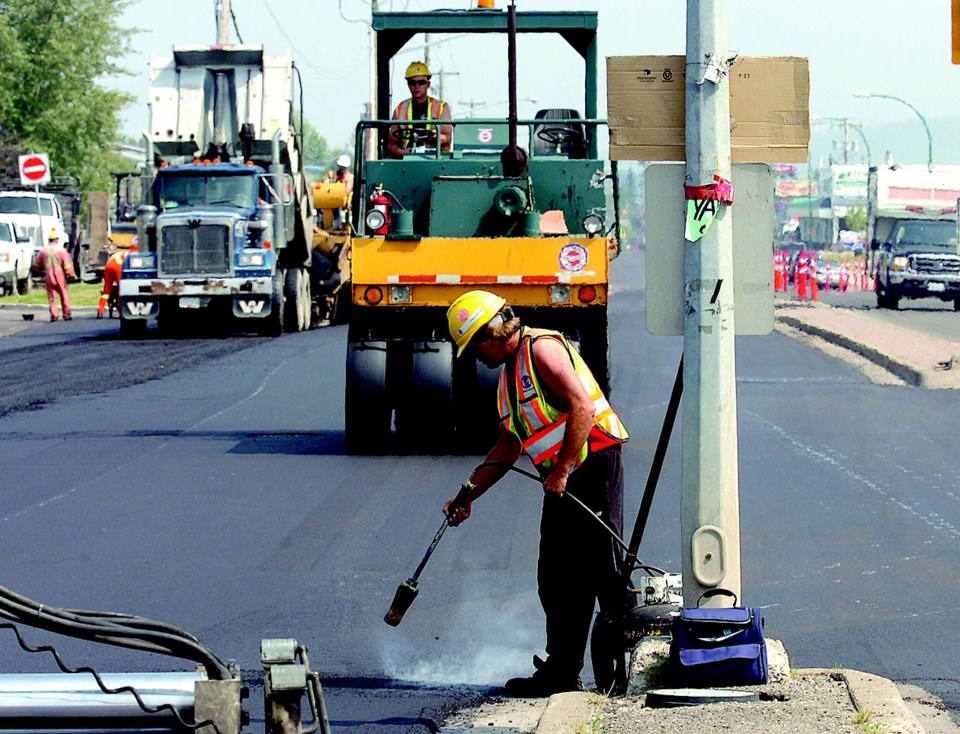City staff are breathing sighs of relief now that most local paving projects have been completed.
Three weeks of virtually rain-free weather this month allowed crews from Columbia Bitulithic to repair potholed and cracked major thoroughfares.
"It's great to see the roadwork that's been completed; we've done a record amount of paving and it looks fantastic," said Mayor Shari Green. "The lines are being painted as quickly as we can and I'm getting a ton of positive feedback. I'm really appreciative that council went the extra mile this year to do what we could to address what was really a bad pothole situation. People said they'd never seen anything like it."
In response to intense public pressure, the city drew an additional $1.9 million from a reserve fund to add to its $3.5 million road rehabilitation budget for a $5.4 million total, allowing four additional paving projects to be approved. The reserve fund had been allocated to cover taxpayers' share of improvements to Fourth Avenue, a project which has been put on hold.
The city estimates its needs $7 million annually to keep up with road maintenance, twice the $3.5 million budgeted in each of the past two years. Green said the city will be forced to either raise taxes or cut services to fill that gap, a process that will be worked out once the city's core review is complete.
It's now smooth sailing for traffic on repaved stretches of Massey Drive, Ospika Boulevard, Tabor Boulevard, Great Street, Fifteenth Avenue, P.G. Pulpmill Road, Domano Boulevard and Winnipeg Street. The city accessed a grant from ICBC to reconfigure Winnipeg Street from four lanes to three to allow for centre turning lanes and bike lanes on either side.
"The best time to pave is when the sun is shining, so we've been able to proceed without weather issues," said city transportation manager Al Clark.
The Ministry of Transportation repaved the intersection of Highways 16 and 97 and an adjacent stretch of Highway 16 heading into the downtown area. Highways, which are not subject to road restrictions, carry higher traffic volumes and road crews dig out the top 10 centimetres and repave to that depth, twice the five-centimetre depth used when crews repair city arterial roads. Clark said roads like P.G. Pulpmill Road, which carry more truck traffic, are dug and repaved to a 10-centimetre depth.
Repaired road surfaces are guaranteed for one year by the contractor. If any defects show up in that time the city will require Columbia Bitulithic to complete repairs.
"Generally we look at a 10- to 15-year lifespan for roads, but you never get that as a guarantee," said Clark. "We've been told to check into a longer road warranty period but for [the contractor] to do that it would put them at risk and so the cost would go up."
The yet-to-be completed paving projects -- Tabor Boulevard from First Avenue to Fifth Avenue; Ospika Boulevard from Davis Road to Tyner Boulevard; and Foothills Boulevard from Nechako Road to the Foothills Bridge -- will begin when the milling machine owned by R.A.P. Tech Milling of Salmon Arm returns to the city. Paving is expected to resume Aug. 13.
In April, Prince George had the dubious distinction of having five of the top-10 worst roads in the province, according to the B.C. Automobile Association. Domano Boulevard was second on that list, followed by Tabor Boulevard (fifth), Fifteenth Avenue (tied for sixth), Massey Drive (tied for seventh) and Foothills Boulevard (eighth).
"We deserved to have our ranking on the BCAA list," said Green. "You can put your head in the sand and wish it goes away or you can say we didn't spend enough. It's not our staff's fault. We haven't given them enough resources."
Green said the city needs to add at least $100,000 to its annual budget for crack-sealing, from the current $250,000. It's preventative maintenance to keep water from reaching the road subsurface and forming potholes.
In June, the city experimented with the Python 5000 one-person pothole-filling machine, which Clark said produced inconclusive results. There were issues with the $250,000 machine getting the right amount of asphalt in each hole and compacting it enough to leave a durable patch. The machine also left loose rocks behind, which required use of a street sweeper.
Pothole patching will continue with two three-person crews staffing hot-box repair trucks. Crews will be concentrating to filling all holes in one area before moving on to the next. Motorists can report potholes by calling city hall at 250-561-7600 or by filling out a online form on the city website, princegeorge.ca.



